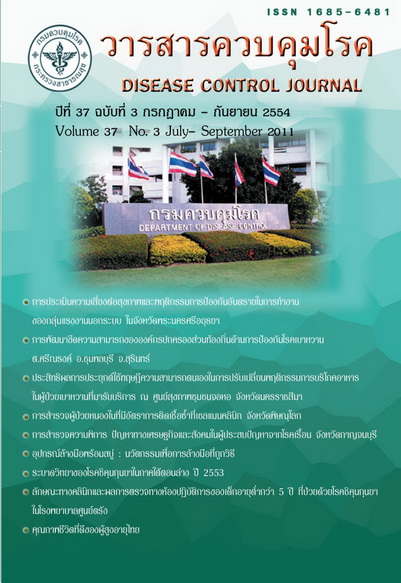Self Efficacy Theory to Consumption Behavior Change in Diabetic Patients attending at Joho Community Health Center, Nakhonratchasima Province
Keywords:
Consumption behavior, Diabetic patients, Joho Community Health CenterAbstract
This quasi experimental study was to study the effectiveness to adapt consumption behavior among diabetic cases. These cases were treated at Joho Community Health Center, Muang district, Nakhon Ratchasima province. Self-Efficacy theory was applied to develop the activities in the study which composed of 1) self success experiences 2) imitate from modeling 3) verbal persuasion and 4) emotional arousal The sample were divided into experiment group and control group. Each group was 50 type II diabetic cases. Data collection was composed of interviewing form and laboratory examination. Data was described by percentage, mean and standard deviation. Both paired t-test and student's t-test were used to compare the mean between before and after the experiment and between experiment and control group. It was found that after experiment the experiment group had more perception to behavior adaptive ability (p<0.001) and more consumption behavior (p<0.001) than the control group. The HbA1c among experiment group was lesser than control group. The HbA1c among experiment group was significant decreased from 9.04% to 7.77% (P<0.01) during the experiment period. Before experiment 36% of experiment group had good and 42% had fair HbA1c level but after 3 month period of experiment 16% had best 28% had good and 48% had fair HbA1c level. The results of this study could conclude that Self-efficacy theory could be applied to adapt the consumption behavior among type II diabetic cases. However, the relatives of those cases should participate in the course to support the adaptive consumption practice of those cases for sustainability of proper behavior.
Downloads
References
คงสมบูรณ์เวช,สมชาย เอี่ยมอ่อง, สมบุญ วงศ์ธีรภัค, สิริเนตร กฤติยาวงศ์, สุนทรี นาคะเสถียร, สุวิช รัตนศิรินทรวุธ, อุไรวรรณ ตวงสินธนากุล ความรู้เรื่องเบาหวานฉบับสมบูรณ์. พิมพ์ครั้งที่3. กรุงเทพมหานคร: บริษัทจูนพับลิชชิ่งจำกัด, 2548.
2. ศูนย์สุขภาพชุมชนจอหอ. สรุปรายงานโรคเรื้อรัง ประจำปี 2549-2552. (เอกสารอัดสำเนา), 2549-2552.
3. กาญจนา ปัญญาธร,สุฑาทิพย์ เทียมวงศ์, กรรณิการ์ คลื่นแก้ว, ลักขณา ศิริบูรณ์ และ อมร คำทะ. การศึกษาแบบแผนการดำเนินชีวิตของผู้ป่วยเบาหวานที่มีปัญหาในการควบคุมระดับน้ำตาลในเลือด โซนราชพฤกษ์ อำเภอเมือง จังหวัดอุดรราชธานี, 2549. วารสารการแพทย์โรงพยาบาลอุดรธานี, 2549; 15 (2): 37-59.
4. อัลเบิร์ตแบนดูรา.ทฤษฎีความสามารถของตนเอง. (Self-efficacytheory) 1997. (ออนไลน์) http://www.novabizz.com/ NovaAce/Personality/Self_Efficacy.htm. 2 มีนาคม 2554.
5. อนันต์ สอนพวง. ปัจจัยที่เกี่ยวข้องกับการรักษาของผู้ป่วย เบาหวานในโรงพยาบาลชุมชน จังหวัดกาญจนบุรี วิทยานิพนธ์ปริญญาเวชศาสตร์ชุมชนมหาบัณฑิต จุฬาลงกรณ์มหาวิทยาลัย,2541
6. ธวัชชัย วรพงศธร. หลักการวิจัยทางสาธารณสุขศาสตร์. พิมพ์ครั้งที่ 2. กรุงเทพมหานคร: โรงพิมพ์ จุฬาลงกรณ์มหาวิทยาลัย; 2538. น.398-399
7. สุภาพร องค์สุริยานนท์. การพัฒนาพฤติกรรมการดูแลตนเองของผู้ป่วยโรคไตเรื้อรังโรงพยาบาลเจ้าพระยายมราช จังหวัดสุพรรณบุรี พ.ศ. 2550 วารสารสาธารณสุขและการพัฒนา 2551; 6: 32- 38
8. สุพรรณี โตสัมฤทธ์ิ. ประสิทธิผลของโปรแกรมการส่งเสริมสมรรถนะแห่งตนด้านพฤติกรรมการบริโภคอาหารต่อระดับฮีโมโกบินเอวันซีในผู้ป่วยเบาหวานชนิดที่2 วิทยานิพนธ์พยาบาลศาสตร์มหาบัณฑิต สาขาการพยาบาลเวชปฏิบัติชุมชนบัณฑิตวิทยาลัย มหาวิทยาลัยนเรศวร, 2549.
9. ศศิธร กรุณา. ผลของโปรแกรมเสริมสร้างแรงจูงใจต่อการควบคุมระดับน้ำตาลในเลือด ของผู้ป่วยชนิดที่ 2 วิทยานิพนธ์พยาบาลศาสตร์มหาบัณฑิต สาขาการพยาบาลผู้ใหญ่ มหาวิทยาลัยขอนแก่น, 2519.
Downloads
Published
How to Cite
Issue
Section
License
Articles published in the Disease Control Journal are considered as academic work, research or analysis of the personal opinion of the authors, not the opinion of the Thailand Department of Disease Control or editorial team. The authors must be responsible for their articles.






